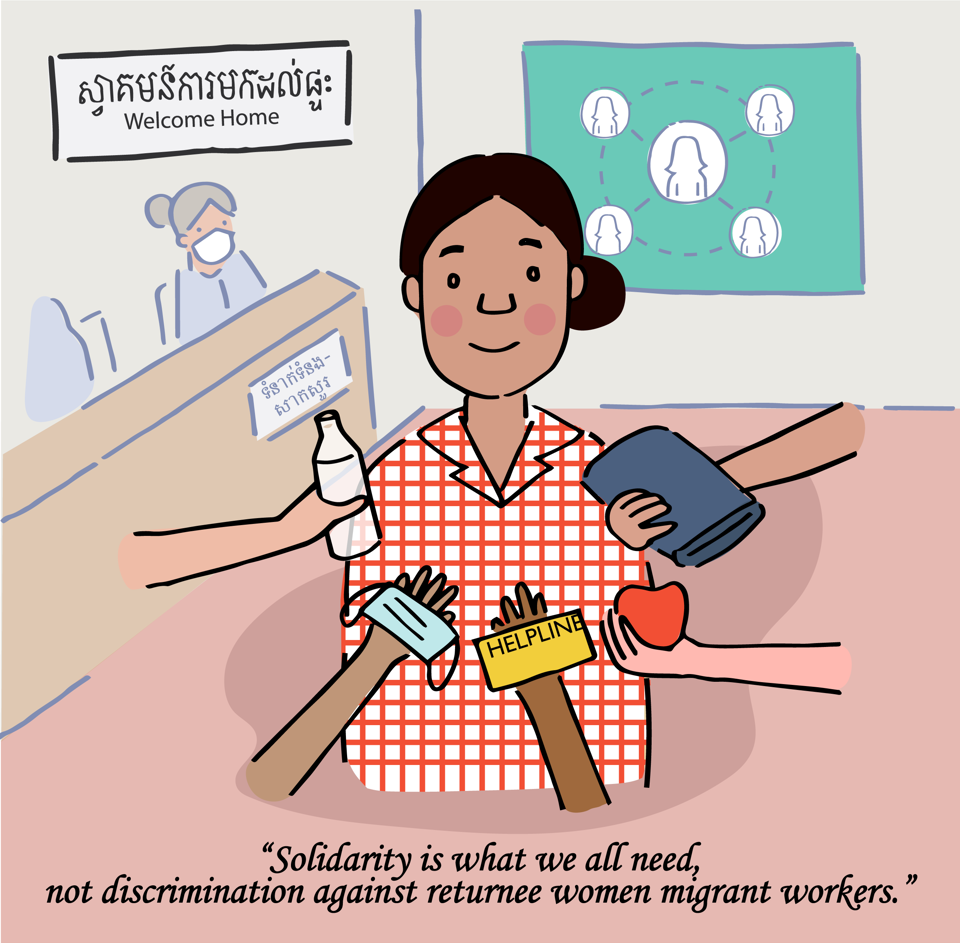“Solidarity is what we all need, not discrimination against returnee women migrant workers.”
Interview with Dok Samuon, member of a peer networking group, Ou Bak Ror Tes commune, Kampong Seila district, Preah Sihanouk province, CambodiaDate:

Dok: “I have worked on numerous construction sites in Thailand for the last 20 years. I am a hard worker with a good reputation with my supervisors. After the COVID-19 outbreak, my work situation quickly deteriorated. Many construction projects were halted in March-April and, of course, this meant no work and no income for me. My colleagues and I stopped working around the time Cambodia celebrated the Khmer New Year. I wanted to be with my family during this difficult time, so I decided to come back to my home country.
Before I came home, I was a bit nervous as I had heard many cases of returnee migrant workers being stigmatized. I was lucky that I was warmly welcomed, and I felt comfortable being in my hometown. Local authorities designated a building as a quarantine centre for me and other returnee migrant workers. They gave me some food, masks, soap and food. I also received the medical checks from local hospital health workers who came regularly to check my temperature along with the other people in the quarantine centre.
After my quarantine period ended, I was introduced to the peer networking group in my community by one of the peer network group, so I can settle in easily. The peer networking group consists of returnee women migrant workers just like me, it’s a group where we could share resources, information and experiences on our migration experiences and if someone wants to hear our experience, we also share our information with them. We help future women migrant workers be informed about services available in case of violence, safe contact numbers and what to do in case something happens in the countries of destination.
When I first joined the group, the members shared PPE products with me despite the shortage. They also educated me on how to keep myself healthy, how to wash my hands, and how to wear a mask. I learned a lot from them during this difficult time and am keeping myself safe thanks to them. I don’t think I would have those products and that knowledge if there was no peer group in my community. Now I do the same for those who recently came back to our town and joined the peer network group. We always update each other about the situation in our community. We also share safe migration information. As many of us went through similar experiences, it is easy to communicate with each other. Peers teach peers! Although we are not official frontline service providers who support women migrant workers, we definitely support each other as we are able to understand each other’s situation and challenges better than anyone else.
To women migrant workers who are still abroad, I would like to say: Keep yourselves safe and stay connected with your loved ones. It is important to have up-to-date information on available services, including in response to violence and abuses, and rules on migration procedures. If possible, try to form a small network with your colleagues. It could be as simple as something like a group chat in mobile messengers. For those who are planning to come back, I would like to say: Welcome home, you are most welcome. Solidarity is what we all need, not discrimination against returnee migrant workers.”
The ILO-UN Women programme “Safe and Fair: Realizing women migrant workers’ rights and opportunities in the ASEAN region”, under the global EU-UN Spotlight Initiative to eliminate violence against women and girls, supports front-line service providers to ensure essential services are available for women migrant workers who are subject to violence. More: www.spotlightinitiative.org/safe-and-fair
More contacts of service providers are available in the Service Directory for Women Migrant Workers in the ASEAN region: https://bit.ly/services4wmw
Interviewed by Sophea Khun
Written by Younghwa Choi
Edited by Gihan Hassanein